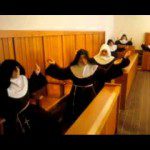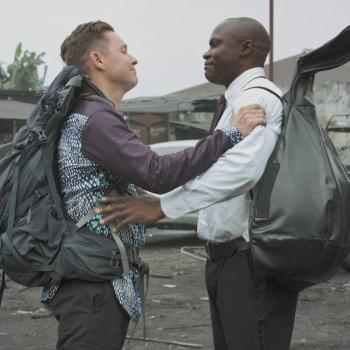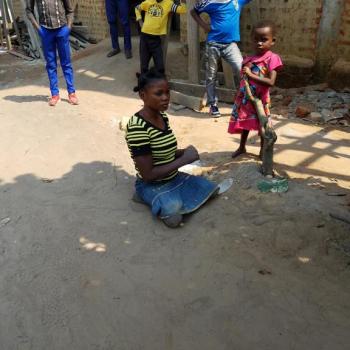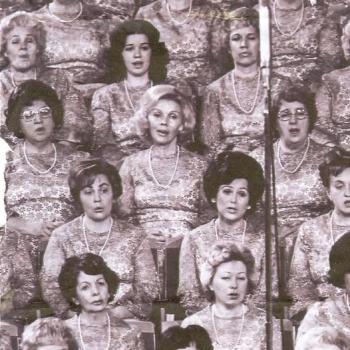
Liberal people had been to Europe and let you knew it. They had Continental tastes, exposure to the latest fashions, and eagerly embraced whatever was new and exciting. They were the daring crowd, the ones who were unafraid to live life on the edge. Bohemians, free thinkers, beatniks, hippies—all prided themselves on being open to take risks and throw off convention. . .Invariably liberal Mormons do not read their scriptures every day. They do not attend the temple, they do not show up to help someone move, and they do not Home Teach or Visit Teach with regularity. They view those who do as quaint minions who never question authority and who follow the rules like mindless sheep. The one thing they do subscribe to with gusto, however, is free agency. In fact, free agency is their justification for the Designer Gospel they have refurbished to suit their individual tastes. . .Former Young Women President, Elaine Cannon, once said, “When the Prophet speaks, the debate is over.” This is because the prophet is speaking for God and telling us what He would have us hear. He is not just the president of a corporation, giving us his personal views.
I commented on the site that the article saddened me. I then attended a presentation by Tom Griffith titled “Negotiating Faith Challenges.” Tom urged us to support not only leaders but one another “in all patience and faith.”
By the time Tom’s presentation was over, Meridian had pulled the article and posted an apology, granting that it had been “extremely offensive.” Of course, Tom had nothing to do with Meridian’s response. It was the readers who, with only one exception, voiced their discomfort with the broad brush labels. The author defended herself by saying that she had been misread, that she wasn’t talking about politics but about obedience. Ah, there’s the rub. In the very act of accusing others of “disobedience,” we are uncharitable–which is a greater sin.
A friend of mine said that she could easily be a B+ Mormon, but she had no desire for the full package, and felt that Mormons were in a perpetual “Advanced Progress” class, where the “cafeteria Mormons” didn’t fit.
I’m afraid that her perception is often accurate. We Mormons can be harsh judges. And yet we do so much so well! Our service model is magnificent, and our humanitarian efforts beautiful. When we are serving others, especially those not of our faith, we don’t care whether they’re smoking or staggering out of a bar. They’re outside our orthodoxy, and we’re doing something good. But when someone chooses to join us, the dividing line inevitably appears, and every item of the check list which Meridian published is available as a measuring stick.
A dear friend and I took a cross-country trip this past summer. She had not been active in the church for years. She was harshly judged as the daughter of
smokers and felt like an outcast. So, like many others, she simply stopped associating with the LDS Church. As we traveled, she quit smoking. In Texas, she had a long conversation with a lovely Mormon who said, “You don’t have to have a testimony to go to church.” That was her inspiration, and she decided to return to church activity. I do not ask her any “rate your testimony” questions. Her faith is none of my business except as I can be at her side to comfort or support her. And she is my friend, not my project.
Can we accept someone into our sacrament meetings who likes wine? Is there even any question? Can they come if they aren’t sure if they believe the Joseph Smith story? Can we accept those who do not read their scriptures and do not have–perhaps do not want–a temple recommend? There should be no debate. Then it gets hard. Can we accept the intolerant or those who make themselves judges? Can we accept the prideful? Can we accept “Checklist Mormons” who do their visiting teaching regularly but gossip during every visit? By “accept”, I don’t mean that we’re willing to shake their hands and smile, but that we ACCEPT them as part of our ward family, just as we’d accept a quirky uncle who constantly quotes political mantras from the “other” camp. Can we find ways to love them and to be with them in their difficulties without harboring judgment ourselves?
There should be no debate. All are welcome. None should be turned away.
I loved Morgan Davis’s response to the Meridian article: “Be gentle. Someone has fallen.”
That is Christlike.
I have a son who does not consider himself LDS. He nonetheless joins us in hymns every Sunday, and sings with joy and vigor. Each of my children has created their own pathway to faith, and I honor their journeys. My own faith tells me that the church itself is not eternal, but the principles we begin to learn within the church framework are. And charity is the most important. (I love the fact that the Spanish for “principle” is “principio” or BEGINNING.)
I’m straightforward about how much I love being in the temple, and I do long for all to partake of the spirit I find there. Yet I know that not everyone will feel as I do. And so there is room all around the temple for anyone to enjoy the landscape, the seasonal change of the flowers, Christmas lights, songs.
All of us can sing “Prone to wander–Lord, I feel it! Prone to leave the God I love” throughout our lives as we recognize how deeply we are called to love and how often we fail. Does anyone love enough during this life? Does anyone have enough faith to pass through all the refining tribulations mortality offers without falling for easy answers and clichés? Every trial is an invitation to stretch higher into the realms of love and faith. We allow ourselves to weep during our grieving times, with faith that “joy cometh in the morning.” And perhaps, joy comes in the MOURNING as well, as we link arms and hold one another in our prayers.
I love Reynolds Price’s description of a vision he had while he suffered from cancer. He saw Christ, who told him, “Your sins are forgiven.” That, thought Price, was the last thing he needed or cared about. He wanted his cancer healed! “But am I cured?” he demanded. Christ turned to him and nodded slightly and a bit reluctantly. “That too.”
”I needed forgiveness more than I needed healing,” Price concludes in his book.
Don’t we all? Forgiveness is the most integral part of our healing in that it heals not only us but those with whom we associate. It binds not only wounds but hearts, sealing rifts so that we may become united families and communities; that we may feel each other’s pain and give comfort. And this is most especially true when one of us has fallen–in any way.













